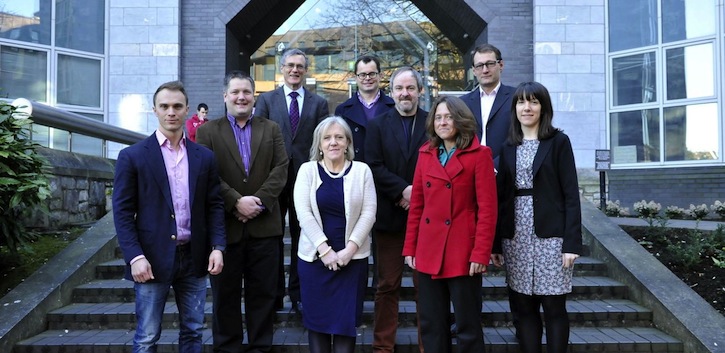2013 Press Releases
Supporting LIFE in Malawi

A UCC consortium which secured a €3.7M EU award is using groundbreaking tactics including mobile health apps to assist rural front-line health workers combat disease in Malawi.
A consortium led by Dr John O’Donoghue and Dr Joe Gallagher, Co-Directors of the Health Information Systems Research Centre (HISRC), Business Information Systems, UCC have secured €3.7 million in funding for health research from the European Union Seventh Framework Programme (FP7).
The Supporting LIFE (Low-cost intervention for disease control) project is designed to provide low-cost, effective, and targeted mobile health information systems to improve child health and address inadequate healthcare infrastructure in Malawi, Southern Africa.
At present,the major causes of mortality in children under 5 years of age in Malawi are malaria and infantile diarrhoea, as well as pneumonia, measles, sepsis, and meningitis. In fact, almost one in ten children in Malawi die before their fifth birthday and, on average, only 1 in 3 children with fever are taken to a health-care facility. The areas most affected are rural regions where adequate health-care facilities are lacking and access to appropriate care, with prompt symptom and illness recognition, as well as treatment, is scarce. 80% of the population of Malawi live in rural areas.
Dr O’Donoghue is the Coordinator and lead Principal Investigator on the project which involves a multinational group of experts from UCC, University of Oxford, Lund University, Mzuzu University, Accelopment, and two non-governmental organisations in Malawi, Luke International Norway and Ungweru. The Supporting LIFE project will apply a novel combination of smartphone technology, wireless body area network sensors and expert decision support systems to equip the Ministry of Health’s front-line health-care workers in Malawi with mobile devices and applications to assist in their assessment, diagnosis and treatment of seriously ill children. The groundwork for the project was laid through the Science Foundation Ireland funded Electronic National Early Warning Scorecard project, led by Prof. Frédéric Adam, and it also received support from Enterprise Ireland and the Health Research Board.
The Supporting LIFE project is fully in line with the Integrated Management of Childhood Illness (IMCI) protocols - an approach created by the WHO and UNICEF in the 1990s - which provide standards for classifying and treating common causes of death in children in developing countries with the aim of improving survival and disease control. Ultimately, the overarching three-faceted goal of IMCI is the prevention, early detection, and treatment of disease. To that end, Supporting LIFE will provide community health-care providers - Healthcare Surveillance Assistants (HSAs) – with a mobile phone based electronic IMCI (e-IMCI) application. They will also be trained in the use of simple sensors for heart rate, breathing rate, temperature and blood oxygen levels. This will support and improve their assessment, diagnosis, and treatment of children with a range of illnesses such as malaria, infantile diarrhoea and pneumonia among others, helping to ensure young children receive the appropriate care at the right time and their lives are spared from a preventable death.
Dr Simon Woodworth, Senior Researcher at the Health Information Systems Research Centre (HISRC) says: “The impact of Supporting LIFE will be immediate as the e-IMCI application will provide local HSAs with an easy to use and effective decision support tool. In remote and rural areas of Malawi this will be critical for improving point of care diagnosis and treatment of seriously ill children. Not only that but mobile devices are widely used, even Android smartphones and tablets are being adopted, and Malawi is currently rolling out advanced mobile phone networks such as 4G. Supporting LIFE also leverages these strengths by using e-IMCI as an educational solution for HSAs to foster on-going knowledge exchange, communication, support and training”.
Siobhán O Connor, Research Coordinator at the HISRC, highlights the potential for this project to further enhance guidelines: "In addition to guiding HSAs in the diagnosis and treatment of illness this system will collect data to allow us to identify ways to refine and strengthen IMCI guidelines using new sensor technology for children's vital signs."
Dr Gallagher, who spent time working as a medical doctor in rural clinics in Malawi, adds: “I can see the direct benefit Supporting LIFE will have on the ground. Building the capacity of local people to use information technology will facilitate the collection of child health data, allowing us to build a large digital database of disease statistics. The e-IMCI application will give us the ability to perform in-depth epidemiological research by identifying and tracking outbreaks of infectious diseases in young children. By collaborating with the Ministry of Health in Malawi we can then better manage and control the health of this vulnerable population thereby reducing child morbidity and mortality in Malawi and overall supporting life.”
